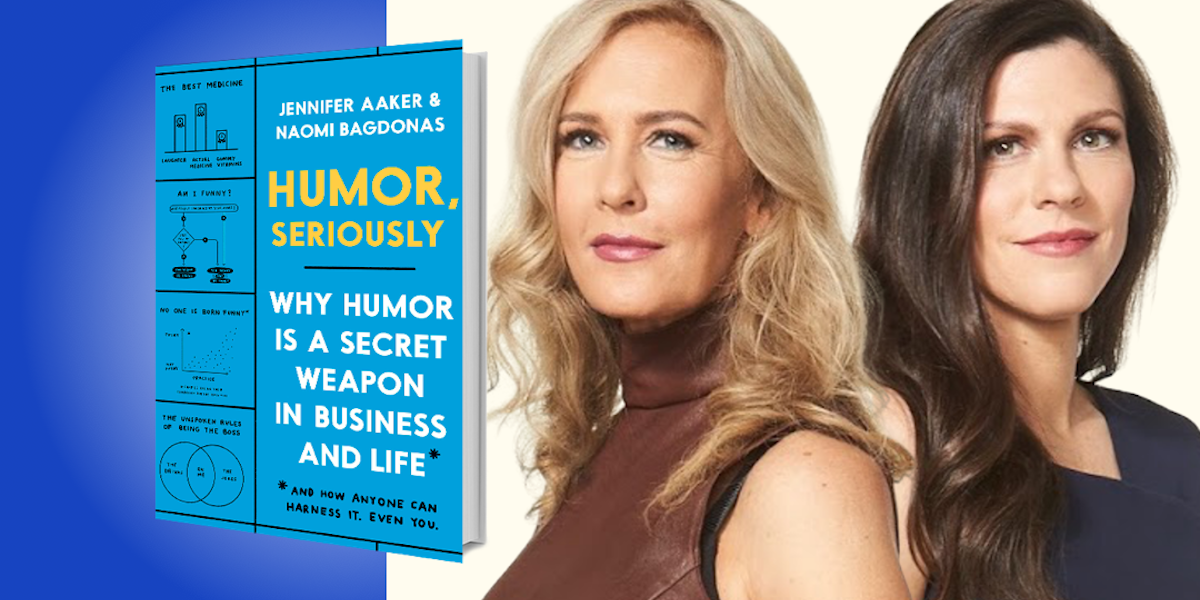Dr. Jennifer Aaker is the General Atlantic Professor at the Stanford Graduate School of Business, and was named one of the most influential women in technology by Fast Company. Naomi Bagdonas is an executive coach and trained improv comic who has appeared on Saturday Night Live and the Today Show. Together, they teach “Humor: Serious Business,” a popular Stanford course that helps, as they put it, “hard-driving, blazer-wearing business minds have more joy in their work and lives.”
Below, Jennifer and Naomi share 5 key insights from their new book, Humor, Seriously: Why Humor Is a Secret Weapon in Business and Life. Download the Next Big Idea App to enjoy more audio “Book Bites,” plus Ideas of the Day, ad-free podcast episodes, and more.
1. You can’t afford to be humorless.
Most leaders are massively underinvested in humor, which is too bad because comedy has enormous benefits for mental well-being, physical health, and even your bottom line. When people crack jokes at work, they are 23% more respected. Employees who think their bosses are funny are 15% more satisfied and engaged in their jobs. Studies have shown that if you add a mildly amusing line to the end of a sales pitch—something like “that’s my final offer … and I’ll also throw in my pet frog”—you’ll increase your customer’s willingness to pay by 18%. Why is humor so effective? Because shared laughter accelerates a feeling of closeness and trust. So if you’re trying to accomplish something important, don’t write off humor. Instead, ask yourself how you can use it to better accomplish your goals. And consider throwing in your pet frog.
2. Humor changes our brains.
Humor is chemical. When we laugh, our brains release a cocktail of healthy hormones—dopamine, endorphins, oxytocin—that change how we feel (more calm, confident, and resourceful) and how others perceive us (more influential, likable, and trustworthy). Humor also makes you live longer. A 15-year study in Norway found that people with a sense of humor live, on average, eight years longer, in part because they have a 30% better chance of surviving severe diseases. (And remember, this study was done in Norway, not a country known for its comic chops.) Laughter literally makes us resilient. It may actually be the best medicine—after, you know, real medicine.
“Toddlers laugh 300 times a day, but it takes a middle-aged adult two-and-a-half months to laugh that many times.”
3. We’ve all fallen off the humor cliff.
Toddlers laugh 300 times a day, but it takes a middle-aged adult two-and-a-half months to laugh that many times. Sadly, we grownups have fallen off the humor cliff. How do we climb out? First, observe. Humor isn’t about inventing the perfect one-liner but about noticing what’s true in your life. Try writing down five observations from your day. Next, use the rule of three to order those observations in a list where the last item is a bit unexpected. Finally, exaggerate that third thing even further so you end up with something like: The most thrilling part of my day is when I get dressed to the nines, leave my house, and circle the block just to feel something.
4. Find your authentic humor style.
Why don’t more people use humor at work? Because they don’t think they’re funny. But humor isn’t about being funny: It’s about cultivating joy, shifting your mindset, and looking for reasons to smile. Also, everyone has a sense of humor. It’s part of how you see the world, whether you express it or not. Your sense of humor is like a muscle—even if it feels weak right now, the more you flex it, the more comfortable and natural it becomes to make yourself and others laugh. To do that, it helps to find your authentic humor style.
“Humor is ultimately an act of love.”
Most people fall into four broad humor styles. Some are stand-ups, natural entertainers who build intimacy through teasing. Others are sweethearts who use humor to lift up those around them. Snipers, by contrast, are edgy and sarcastic. Finally, there are magnets—big personalities who gets everyone laughing while radiating charisma.
5. Humor mitigates life’s greatest regrets.
Humor isn’t just a way for us to be more effective leaders and more joyful people—it’s also a way for us to lead lives of greater meaning. Research conducted by hospice workers has revealed that when most people look back on their lives, they regret not being bold, authentic, present, joyous, and loving. Humor mitigates all five of these regrets. It defuses tension, thereby allowing us to take bigger, bolder risks. It empowers us to share parts of ourselves that are unconventional and authentic. Humor requires us to be fully present, to listen hard, and to search for observations in each moment. It creates endless opportunities to experience joy. And because there are few acts as easy and generous as sharing a laugh with someone, humor is ultimately an act of love.
For more Book Bites, download the Next Big Idea App today:

































